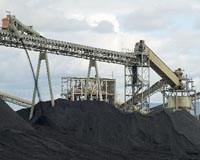| . |  |
. |
Grossraeschen, Germany (UPI) Oct 23, 2009 An eastern German region devastated by decades of strip mining is trying to reinvent itself with renewables and a new form of eco-tourism. Meet Gerold Schellstede. The German entrepreneur has taken $6 million of his money to turn a run-down 19th century villa in Grossraeschen in Brandenburg into a 4-star "Lake Hotel." The problem? There is no lake. At least not yet. Schellstede's hotel sits at the edge of a giant decommissioned strip mine that is currently flooded into a 2,000-acre lake. By 2015, when the water has finally filled the lake, the barrel-chested entrepreneur hopes for droves of guests to dive into water where once was only dead land. "I believe in that lake and I believe in this region," Schellstede, who is currently building another guesthouse right at the shore, told United Press International in an interview Thursday. The Lausitz region, near the border with Poland, once was a major energy hub. It has yielded more than 2 billion tons of brown coal since mining started here in the late 19th century. Most of the large-scale mining started after World War II, with East Germany's communist regime trying to feed the economy's growing energy hunger with domestic brown coal. But this came at a price. In the 1980s, the Communist regime decided to enlarge the existing strip mine near Schellstede's hotel. East Germany's Communist leadership expropriated and resettled more than 4,000 people to carve the coal from the ground. An entire village simply vanished. The East German brown coal industry, producing some 300 million tons per year, devastated roughly 470 square miles of land. "The values that were mined away were never given back to the people," said Thomas Zenker, the mayor of Grossraeschen. "It was a city filled with fears of loss." With Germany's reunification in 1990, virtually all mines were closed down. People left for western Germany to look for jobs or stayed behind to live off unemployment aid. This has been changing recently. Yes, unemployment still towers at 18 percent here -- roughly double the German average. But the German government has tried to improve the outlook of the region. Since 1990, Berlin has spent roughly $12.8 billion trying to undo the damage from East Germany's strip mining and unleash a structural transition, also in the energy sector. Today, some 40 percent of the electricity consumed in Brandenburg comes from renewable sources, and thanks to lucrative state subsidies, numerous top-notch wind, solar, biomass and biofuel companies have settled here. The state is home to state-of-the-art solar plants from industry giants Conergy and U.S.-based First Solar, with several other PV companies and research organizations located in the Berlin-Brandenburg region. The renewable energy sector employs more than 5,000 people in Brandenburg, a state with 2.5 million citizens. The city of Lauchhammer, also in Lausitz, lost nearly 12,000 jobs linked to coal. Today it is home to a highly efficient wind turbine plant from Danish giant Vestas. It's also using a decommissioned strip mine to plant an energy forest that would be "harvested" for further use in a combined heat and power plant. But most of the remaining mines, around 20, will be flooded -- to create Europe's largest system of artificial lakes officials here hope will attract tourists from all over Germany. Zenker, the mayor of Grossraeschen, even pushed for a landing bridge to be installed at the shore of the imaginary lake. The city had the bridge built out of a 220-foot nose of an old bucket wheel that was intended to go to the junk yard. It now reaches into the lake bed, linking the mine's industrial past to its (hopefully) bright new tourist future. "When we first had the idea to create 'Lausitz Lake Country' people thought we were crazy," Zenker said. "More and more people now believe in our vision." Share This Article With Planet Earth
Related Links Surviving the Pits
 US Coal Peak Production: Point And Counterpoint
US Coal Peak Production: Point And CounterpointBoulder CO (SPX) Oct 22, 2009 A timely debate on "United States Coal Peak Production" will enliven the October annual meeting of the Geological Society of America in Portland, Oregon this week. Highly regarded experts, Dr. David B. Rutledge of the California Institute of Technology (Caltech) and Dr. Frank Clemente of Pennsylvania State University (Penn State) will be keynote speakers presenting opposing views. ... read more |
|
| The content herein, unless otherwise known to be public domain, are Copyright 1995-2009 - SpaceDaily. AFP and UPI Wire Stories are copyright Agence France-Presse and United Press International. ESA Portal Reports are copyright European Space Agency. All NASA sourced material is public domain. Additional copyrights may apply in whole or part to other bona fide parties. Advertising does not imply endorsement,agreement or approval of any opinions, statements or information provided by SpaceDaily on any Web page published or hosted by SpaceDaily. Privacy Statement |